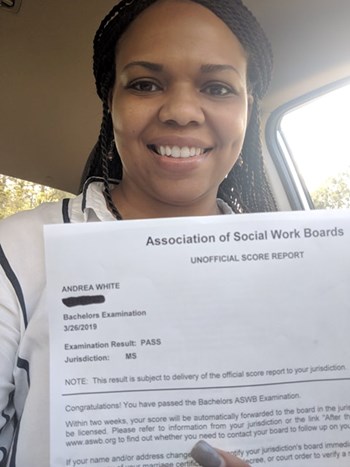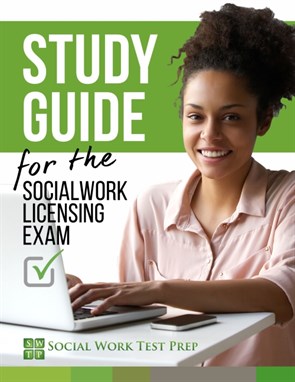 You Can Get It Done
You Can Get It Done
Overwhelmed by the studying you have to do? Yes, there's an enormous amount of information that could show up on the social work exam (just look at the ASWB content outlines). But what actually shows up on the exam is likely to be narrower, simpler, and easier to prepare for.
The people putting together social work licensing exams want to make sure that licensed social workers are compassionate, ethical, law-abiding professionals. They commission questions designed to test for those qualities. (The ASWB says as much in their writer's screening.) That means exam questions will tend to present real-world, close-call, social work situations. You may be able to answer many of them without preparing at all. Just go with your social work gut.
That doesn't mean you shouldn't study. The best way to prepare is to practice. Practice gets you familiar with the rhythms of the test and gives you a chance to begin burning off test anxiety. So, if you've purchased SWTP Practice Tests, you're off to a great start.
Keep in mind: You've made it this far; this exam won't be the hardest thing you've ever faced or ever will face. You can get it done!
Getting Started
With each SWTP exam you purchase, you get three runs through the exam in timed exam mode and unlimited review in untimed study mode. We suggest getting underway on SWTP with a four hour, timed exam to gauge your readiness. Then, in study mode, review rationales and suggested study links for all answers, whether or not you got them right on the exam.
Your exam subscription expires after 90 days (unless you request an extension). It makes sense to take the first of the three timed tests you get early on (day 1), the second halfway through your study window. Take the exam a third time closer to your scheduled exam date, while still allowing time to review answers.
Exam Basics
It's helpful to have some rules of thumb when attacking each new exam question. Remembering that doing no harm and operating within scope of practice is essential. Asking yourself, "What would the by-the-book perfect social worker do in this situation?" can often help shake loose a correct answer.
For more social-work-exam-specific test prep strategies, try these links:
More general study skills wisdom is collected around the web--most university web sites have space dedicated to the topic, for example: links:
Managing Test Anxiety
The test is a big deal and everyone gets anxious about it to some degree. Test anxiety is like any other anxiety you might have experienced and will respond to the same tried-and-true anxiety reduction efforts that have worked for you in the past. How do you calm yourself when worried? CBT...meditation...exercise...progressive muscle relaxation...or maybe just letting the anxiety flow and focusing on the task at hand. Put them to use! Here, some collected tricks and tips:
For free anxiety reduction tools--including lots of CBT--try Therapy Worksheets.
Essential Review
 Sign up on the site to receive our free Study Guide for the Social Work Licensing Exam. The guide includes exam basics, links from this page, additional study tips, free practice questions, licensing board info, and lots more.
Sign up on the site to receive our free Study Guide for the Social Work Licensing Exam. The guide includes exam basics, links from this page, additional study tips, free practice questions, licensing board info, and lots more.
If there's something you need to know for the exam that can't be found on the web, we have yet to discover it. Here are links to some essentials:
- The NASW Code of Ethics. There's nothing more important to have a good grasp on. Will this be on the test? Yes!
- ASWB and BBS post basics about what to expect on the test--browse for candidate handbooks on each.
- Standards of Practice. Freshen up on the basics of social work practice.
- Find DSM-5 details at PsychCentral, Wikipedia , and elsewhere on the web. If looking to save time, we suggest focusing on the standard diagnoses found in a front-line social work setting (e.g., depression, anxiety, bipolar disorder, PTSD, ADHD, personality disorders...). Close-call differentials (e.g., schizoaffective disorder versus schizophrenia) are also worth attention. For more in-depth information, try the National Institute for Mental Health.
Your MSW program textbooks are also a great resource. Board question writers are required to cite published sources for each item they submit. What are they likely to use? Their MSW program textbooks.
Additional Review
Got the essentials down? The Suggested Study links that accompany each question in the SWTP practice exams are a great next step toward deeper review. For additional exposure to exam-related content, try browsing these sites:
And of course, SWTP's long-running blog--test-taking research, success stories, and additional practice questions there:
There's still more help, including tutoring, on SWTP's Resources page. Don't be shy about Googling to find more about areas you feel uncertain about. If you discover sites that you think should be included here, please send them in.
Congratulations on getting underway in your exam preparation. Good luck! Let us know how you do!

 You Can Get It Done
You Can Get It Done Sign up
Sign up